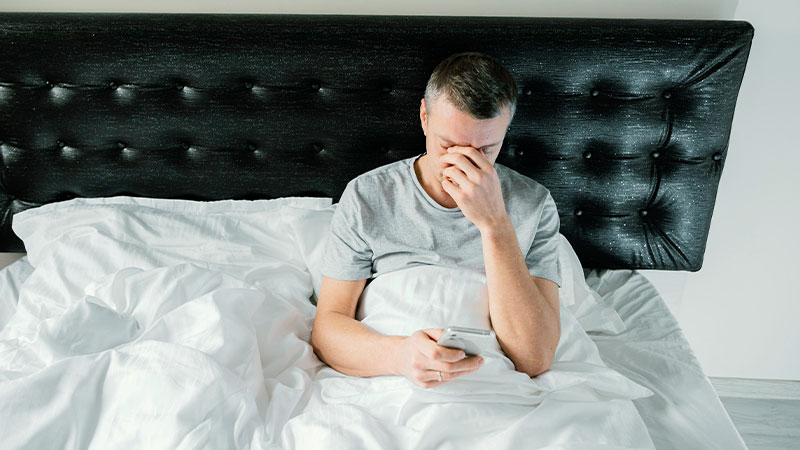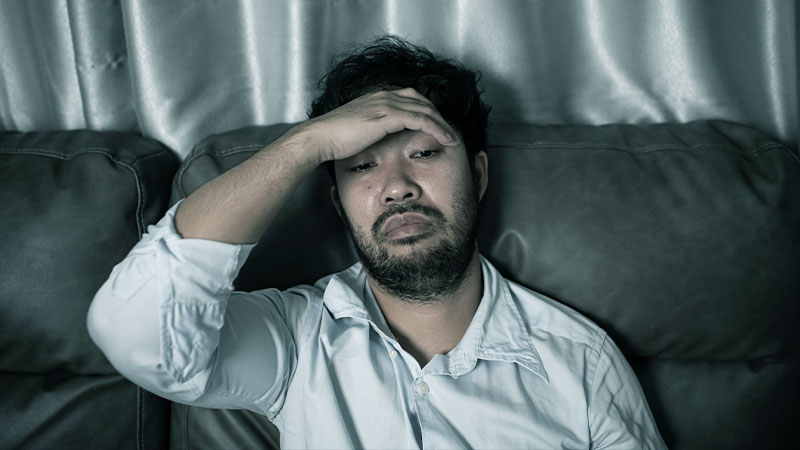Do you often find yourself lying awake at night, consumed by worry and unable to drift off to sleep? You might be experiencing sleep anxiety.
Sleep anxiety, also known as somniphobia or sleep dread, is characterized by the fear and anxiety related to sleep.
This condition can lead to restlessness, racing thoughts, physical symptoms like a racing heart, and chronic insomnia. Understanding the symptoms of sleep anxiety is crucial for identifying and addressing the issue effectively.
This blog post delves into the common signs of sleep anxiety, helping you recognize and seek appropriate treatment.
By becoming aware of these symptoms, you can take proactive steps toward managing your anxiety and achieving a better night’s sleep. So, stay sharp.

What Is Sleep Anxiety?
Sleep anxiety, also known as somniphobia or sleep dread, is the fear or anxiety related to going to sleep. This condition can stem from various concerns, such as fear of nightmares, sleep paralysis, or not waking up.
Individuals with sleep anxiety often experience significant stress and worry around bedtime, making it challenging to fall asleep.
This anxiety can lead to insomnia, further exacerbating the fear of sleep due to the potential negative impacts on daily functioning and overall health.
The condition can be triggered by past traumatic experiences, general anxiety disorders, or an association of sleep with negative events.
Symptoms may include restlessness, racing thoughts, physical symptoms like a racing heart or sweating, and avoidance behaviors, such as delaying bedtime.
Treatment often involves cognitive-behavioral therapy (CBT), relaxation techniques, and, in some cases, medication to manage anxiety symptoms and promote healthier sleep patterns.
Common Sleep Anxiety Symptoms
Sleep anxiety, also known as somniphobia or sleep dread, can manifest in various ways, affecting both the mental and physical well-being of individuals.
Understanding the symptoms is crucial for identifying the condition and seeking appropriate treatment. Here are some common symptoms of sleep anxiety, elaborated under specific headings:
1. Restlessness and Difficulty Falling Asleep

One of the most prominent symptoms of sleep anxiety is restlessness. Individuals often find it challenging to relax or settle down at bedtime.
Their minds may be flooded with anxious thoughts about sleep, preventing them from drifting off.
This persistent restlessness can lead to prolonged periods of wakefulness, making it difficult to fall asleep even when they feel physically tired.
2. Racing Thoughts and Excessive Worry

Those suffering from sleep anxiety often experience racing thoughts, particularly as bedtime approaches.
These thoughts might include worries about not getting enough sleep, the consequences of sleep deprivation, or irrational fears about sleep itself.
This excessive worry creates a vicious cycle, where anxiety about sleep leads to more difficulty sleeping, further increasing anxiety.
3. Physical Symptoms

Sleep anxiety can trigger various physical symptoms that mimic general anxiety responses. Common physical manifestations include:
- Increased Heart Rate: Anxiety can cause the heart to race, making it hard to relax.
- Sweating: Night sweats or excessive perspiration at bedtime can occur.
- Trembling or Shaking: Anxiety can cause uncontrollable shaking or trembling.
- Shortness of Breath: Difficulty breathing or a sensation of suffocation can intensify the fear of falling asleep.
- Stomach Issues: Nausea, upset stomach, or even gastrointestinal disturbances can result from sleep anxiety.
4. Nightmares and Night Terrors

For some individuals, sleep anxiety is closely linked to nightmares or night terrors. The fear of experiencing these disturbing dreams can make the prospect of sleep frightening.
Nightmares are vivid, frightening dreams that can cause a person to wake up feeling scared and distressed.
Night terrors, on the other hand, involve sudden arousals from deep sleep accompanied by intense fear, screaming, and confusion.
5. Insomnia

Insomnia is both a symptom and a consequence of sleep anxiety. The ongoing worry and fear associated with sleep can lead to chronic insomnia, characterized by difficulty falling asleep, staying asleep, or waking up too early.
Insomnia further exacerbates anxiety, as individuals become increasingly concerned about their inability to get restful sleep, creating a self-perpetuating cycle of anxiety and sleeplessness.
6. Avoidance Behaviors

To cope with their fear of sleep, individuals with sleep anxiety may develop avoidance behaviors.
This can include delaying bedtime, engaging in stimulating activities late into the night, or using substances like caffeine or alcohol to stay awake.
While these behaviors might provide temporary relief from anxiety, they ultimately disrupt sleep patterns and worsen the problem.
7. Daytime Fatigue and Impairment

The impact of sleep anxiety extends beyond nighttime. The lack of restful sleep often results in significant daytime fatigue, impairing cognitive and physical functioning.
Individuals may experience difficulty concentrating, memory problems, irritability, and decreased productivity.
This daytime impairment can lead to heightened stress and anxiety, further contributing to the cycle of sleep anxiety.
8. Hypervigilance at Night

People with sleep anxiety may become hypervigilant at night, constantly monitoring their environment for potential disturbances or threats.
This heightened state of alertness can prevent the relaxation necessary for falling asleep.
Hypervigilance often includes being overly sensitive to noises, movements, or other stimuli, leading to frequent awakenings and a fragmented sleep pattern.
Through a combination of therapeutic interventions, relaxation techniques, and good sleep hygiene, it is possible to manage sleep anxiety and achieve restful, restorative sleep.
Causes of Sleep Anxiety
Sleep anxiety, or the fear and anxiety related to sleep, can stem from various underlying factors.
Understanding these causes is crucial for identifying and addressing the issue effectively. Here are some common causes of sleep anxiety, elaborated under specific headings:
Traumatic Experiences
Past traumatic experiences, such as accidents, assaults, or other distressing events, can lead to sleep anxiety.
Trauma often results in heightened stress and anxiety levels, making it difficult for individuals to feel safe and relaxed enough to fall asleep. Nightmares or flashbacks related to the trauma can further exacerbate this fear.
Generalized Anxiety Disorder (GAD)
Individuals with generalized anxiety disorder often experience excessive worry and anxiety about various aspects of their lives, including sleep.
The constant state of heightened anxiety can make it challenging to relax and fall asleep. The worry about not getting enough sleep can itself become a source of anxiety, creating a vicious cycle.
Stressful Life Events
Major life changes or stressful events, such as job loss, divorce, or the death of a loved one, can trigger sleep anxiety.
These events can lead to increased stress levels, making it difficult for individuals to switch off their thoughts and relax at bedtime. The anticipation of further stress can also contribute to sleep anxiety.
Fear of Sleep Disorders
Some individuals develop sleep anxiety due to the fear of experiencing sleep disorders such as sleep paralysis, insomnia, or obstructive sleep apnea.
The anticipation of these conditions and the distress they cause can lead to heightened anxiety around bedtime, making it difficult to fall asleep.
Nightmares and Night Terrors
Frequent nightmares or night terrors can instill a fear of falling asleep in individuals. The anticipation of these distressing experiences can lead to anxiety at bedtime.
This fear can be particularly pronounced in individuals who have experienced traumatic or vivid nightmares that disrupt their sleep.
Hyperarousal
Hyperarousal, characterized by a heightened state of alertness and increased physiological arousal, can contribute to sleep anxiety.
This condition can be a result of stress, anxiety disorders, or other mental health issues. The inability to calm down and relax can make it difficult to fall and stay asleep, perpetuating sleep anxiety.
Poor Sleep Hygiene
Poor sleep hygiene practices, such as irregular sleep schedules, excessive screen time before bed, and consuming caffeine or alcohol late in the day, can lead to difficulty sleeping.
Over time, the frustration and worry about not being able to sleep can develop into sleep anxiety.
Sleep anxiety can have multiple causes, ranging from past traumas and generalized anxiety disorder to stressful life events and fear of sleep disorders.
Understanding these causes is essential for effectively addressing and managing sleep anxiety.
How to Treat People Having Sleep Anxiety Symptoms

Treating sleep anxiety requires a multifaceted approach that addresses both the psychological and physiological aspects of the condition. Here are several effective strategies and treatments, elaborated under specific headings:
Cognitive-Behavioral Therapy (CBT)
Cognitive-behavioral therapy is one of the most effective treatments for sleep anxiety. CBT helps individuals identify and change negative thought patterns and behaviors that contribute to their anxiety. Techniques used in CBT include:
- Cognitive Restructuring: Challenging and replacing irrational fears and thoughts about sleep.
- Behavioral Interventions: Developing healthy sleep habits and routines, such as maintaining a consistent sleep schedule and creating a relaxing bedtime routine.
Relaxation Techniques
Relaxation techniques can help reduce anxiety levels and promote a sense of calmness, making it easier to fall asleep. Common relaxation methods include:
- Deep Breathing Exercises: Practicing slow, deep breathing to reduce stress and promote relaxation.
- Progressive Muscle Relaxation: Tensing and then relaxing different muscle groups to release physical tension.
- Mindfulness Meditation: Focusing on the present moment to reduce anxiety and racing thoughts.
Sleep Hygiene Practices
Improving sleep hygiene involves adopting habits that promote better sleep. Key practices include:
- Consistent Sleep Schedule: Going to bed and waking up at the same time every day, even on weekends.
- Sleep-Friendly Environment: Creating a comfortable, dark, and quiet bedroom environment.
- Limiting Screen Time: Reducing exposure to screens (phones, tablets, TVs) before bedtime to avoid blue light, which can interfere with melatonin production.
Medication
In some cases, medication may be prescribed to help manage sleep anxiety symptoms. Types of medication include:
- Anti-Anxiety Medications: To reduce overall anxiety levels.
- Antidepressants: For individuals whose sleep anxiety is related to depression or other mood disorders.
- Sleep Aids: Short-term use of prescription or over-the-counter sleep medications to help establish a regular sleep pattern.
Therapeutic Interventions
Therapy can address underlying issues contributing to sleep anxiety, such as trauma or stress. Types of therapy include:
- Exposure Therapy: Gradually exposing individuals to the fear of sleep in a controlled environment to reduce anxiety.
- Psychodynamic Therapy: Exploring and addressing deep-seated emotional issues that may be contributing to sleep anxiety.
Lifestyle Changes
Making certain lifestyle changes can significantly impact sleep quality and reduce anxiety. These changes include:
- Regular Exercise: Engaging in physical activity during the day to promote better sleep at night.
- Healthy Diet: Avoiding heavy meals, caffeine, and alcohol close to bedtime.
- Stress Management: Incorporating stress-reducing activities into daily routines, such as yoga, journaling, or hobbies.
Support Groups and Education
Joining support groups can provide individuals with a sense of community and shared experiences. Education about sleep anxiety and its effects can empower individuals to take proactive steps toward managing their condition.
Treating sleep anxiety involves a comprehensive approach that includes cognitive-behavioral therapy, relaxation techniques, improved sleep hygiene, medication, therapeutic interventions, lifestyle changes, and support groups.
By addressing both the psychological and physiological aspects of sleep anxiety, individuals can achieve better sleep quality and overall well-being.
Wrapping Up
Sleep anxiety can significantly impact an individual’s overall well-being, leading to restlessness, racing thoughts, physical symptoms, nightmares, insomnia, avoidance behaviors, and daytime impairment.
Recognizing these symptoms is crucial for seeking appropriate treatment and breaking the cycle of anxiety and sleeplessness.
Effective strategies for managing sleep anxiety include cognitive-behavioral therapy, relaxation techniques, improving sleep hygiene, medication, therapeutic interventions, lifestyle changes, and support groups.
By addressing both the psychological and physiological aspects of the condition, individuals can achieve better sleep quality and improve their daily functioning.
Understanding and addressing the root causes of sleep anxiety is essential for overcoming this debilitating condition and achieving restful, restorative sleep.
Seeking professional help and implementing these strategies can lead to significant improvements in both sleep and overall mental health. Best of luck.
